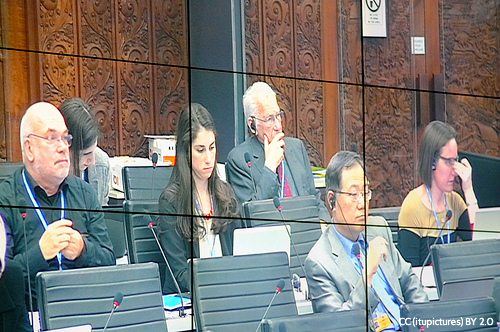IGF 2013: Civil society, human rights and surveillance
by Digital Rights LAC on November 22, 2013
By Gloria Patricia Meneses and Amalia Toledo
Two months after the Regional Preparatory Meeting for the Internet Governance in Argentina, took place from 22 to 25 October, the 8th Global Internet Governance Forum in Bali, Indonesia. An event organized annually by the United Nations to promote the dialogue on Internet governance among governments, private sector, academia and civil society.
The theme that framed the 8th Internet Governance Forum (IGF) was “Building Bridges – Enhancing Multi-stakeholder Cooperation for Growth and Sustainable Development.” The purpose was none other than finding the common ground of these multi-stakeholder relations, where complex issues on Internet governance (i.e. sustainability, robustness, security, stability, development, etc.) are evaluated.
However, this was not the only subject under examination. For the first time in the IGF history, human rights were a central discussion axis. The civil society participation has had much to do with the inclusion of this subject. It is no secret the major role that this sector is playing in advocating for digital rights, for a free Internet, for open access and many other Internet-related issues and human rights. Everything indicated that the IGF needed a multi-stakeholder dialogue on human rights threats in the online world.
On the other hand, concerns about continuing violations in the net of the rights to freedom of expression, privacy, anonymity, among others, represented through threats and attacks on journalists, activists and bloggers, were also echoed at the different sessions. This situation has resulted on the lost of confidence by citizens on governments and Internet service providers (ISP). Can the States and ISP restore the confidence in the near future? Will it be the biggest struggle of civil society in the IGF’s future ensuring human rights on the Internet? Questions whose answers we may not have until there is firm commitments from all parties for respecting human rights on the Internet.
Complementing the situation described above, the issue of mass surveillance of citizens deserves separate attention. The information revealed through Snowden’s leaks were of paramount interest for discussing the implications of unchecked online communications surveillance over our human rights. The surveillance program of the National Security Agency (NSA) was on everyone’s lips. With good reasons this issue became the second major focus of the discussions. So much so that even some international press articles referred to the surveillance subject at the Forum as “the elephant in the room.”
The U.S. government delegation was resolute to trying to clean up its image as a human rights protector in digital environments. In this context, it was common to hear U.S. officials downplay criticism against the NSA’s spying program. They defended themselves by using phrases like “everyone does it” and “the government is not perfect.” They also claimed that the U.S. does not use data collection to repress citizens of other countries. Moreover, they argued that such collection is not motivated on social status, religion or political inclinations. As expected, the audience was not swayed by these arguments.
Meanwhile, ISPs were deeply concerned about the loss of users’ confidence as a result of Snowden’s leaks. But they little said about their responsibility, let alone they did not speak of those internal business practices that threaten users’ human rights.
For civil society, however, the IGF served as a platform to challenge these stances, require accountability and demand transparency. Against this, for example, the Internet Engineering Task Force (IETF) stated that online communications surveillance requires attention and resolution of all potential stakeholders. Only then the next Internet level will be reached: a secure and open net that allows for the effective protection and realization of human rights. The IETF calls on the technical communities to create more tools that help ensure the privacy of users and the Internet, which could also assure a well functioning modern society. Moreover, civil society insisted on the 13 Principles on the Application of Human Rights to Communications Surveillance as a guide for designing state surveillance programs from a human rights perspective.
In this context, it is worth noting the call of the Brazilian government delegation and the Internet Corporation for Assigned Names and Numbers (ICANN) on the organization of an international Internet governance summit in Brazil next year. According to the expressions of the Brazilian Minister of Communications, the goal of this event is finding a new Internet governance model, a more neutral one. This responds to the Brazilian government outrage due the scandals of NSA’s spying on their citizens and rulers. We do not know yet the exact date or host city for this event. Nor do we know whether it will be possible to design a model to improve the current. What we do expect is that the improved multi-stakeholder model version respects the contributions that each actor can put in to the development of an Internet more open, safe, multilateral and human rights-based.
As a conclusion, we want to emphasize on the importance that civil society is gaining in this multi-stakeholder platform. Not only it has managed to highlight issues such the one mentioned above, but also its participation is increasingly strong and growing. As shown by the official attendance statistics, 46% of IGF participants came from this sector. This figure is not trivial when considering that the remaining percentage is distributed among governments, private sector, technical communities, media and intergovernmental organizations. Most likely in the coming years we will witness the significance of this on the Forum. Meanwhile, we must recognize that the IGF provides an opportunity to participate on equal terms, in where civil society has a voice and a very loud voice.
Gloria Patricia Meneses is contributor of the Internet Governance Project for Karisma Foundation, activists of RedPaTodos and member of the Mozilla community. Twitter @gpmeneses
Amalia Toledo is member of Karisma Foundation’s Law, Internet and Society Groupand contributor of the Foundation for Press Freedom (FLIP). Twitter: @amalia_toledo






